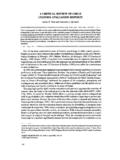Transcription of Louisiana Licensed Professional Board of Examiners LPC ...
1 Louisiana Licensed Professional Board of Examiners LPC Guidelines for Conducting Child Custody Evaluations Preface: The child custody evaluation process involves a comprehensive compilation of information and the formulation of opinions pertaining to the custody or child access. It also involves the dissemination of that information and those opinions to the court, to the litigants, and to the litigant's attorneys so that judges have adequate information about the family that allows the court to make custody decisions that promote the welfare and best interest of the child. The intent of this document is to provide Louisiana Licensed Professional Counselors (LPCs) who have the knowledge, training, and experience to conduct child custody evaluations with additional guidance and direction in this area. It is expected that all LPCs who perform child custody evaluations will do so in accordance the LPC Practice Act and the LPC Board 's Rules, Regulations, and Procedures.
2 The following material was developed from child custody evaluation practice guidelines published through the American Psychological Association Practice Guidelines (2009), the Louisiana Social Work Board of Examiners Guidelines for Child Custody Evaluations (1998), the American Academy of Child and Pediatric Psychiatry Practice Guidelines (1997), the Association of family and Conciliatory Courts Best Practice Guidelines (2006), and the American Counseling Association Code of Ethics (2005). Goals of Child Custody Evaluation The purpose of a child custody evaluation is to determine what is in the psychological best interest of the child. While parents' concerns should be respected and considered, the child's best interest should be the most important consideration. In Louisiana , factors to consider in determining the child's best interest are specified by LA.
3 Civil Code Article 134. This list is nonexclusive and the weight to be given to each factor is within the discretion of the trial court. Art. 134. Factors in determining child's best interest The court shall consider all relevant factors in determining the best interest of the child. Such factors may include: (1) The love, affection, and other emotional ties between each party and the child. (2) The capacity and disposition of each party to give the child love, affection, and spiritual guidance and to continue the education and rearing of the child. (3) The capacity and disposition of each party to provide the child with food, clothing, medical care, and other material needs. (4) The length of time the child has lived in a stable, adequate environment, and the desirability of maintaining continuity of that environment. (5) The permanence, as a family unit, of the existing or proposed custodial home or homes.
4 (6) The moral fitness of each party, insofar as it affects the welfare of the child. (7) The mental and physical health of each party. (8) The home, school, and community history of the child. (9) The reasonable preference of the child, if the court deems the child to be of sufficient age to express a preference. (10) The willingness and ability of each party to facilitate and encourage a close and continuing relationship between the child and the other party. (11) The distance between the respective residences of the parties. (12) The responsibility for the care and rearing of the child previously exercised by each party. II. Guidelines for Evaluator Competence Becoming a child custody evaluator is a specialty area of practice involving an advanced level of education, knowledge, training, and supervision. Any LPC conducting evaluations shall obtain appropriate education and Professional training prior to offering to perform or accept an appointment as an evaluator.
5 Competence may be obtained through academic coursework, continuing education workshops, and supervised practice. LPCs who choose to conduct child custody evaluations are required to closely monitor their competence to practice in this area and refrain from practicing outside of their scope of competence. They are responsible for keeping abreast of best practices in the field and for seeking ongoing Professional development, supervision, and consultation. While Louisiana law does not require specific areas of training for custody evaluation, best practices in the field indicate a need for advanced knowledge and skill in a wide range of topics, including but not limited to the following: (1) Psychological and developmental needs of children, especially as these needs relate to decisions about child custody and access (2) family dynamics, including parent child relationships, blended families, and extended family relationships, and the effects of divorce , relocation, and or remarriage on children (3) family systems theories related to attachment theory, trauma theories, and knowledge of crisis and transition in families (4) Effects of domestic violence, substance abuse, child alienation, child maltreatment including child sexual abuse on the psychological and developmental needs of children, adolescents, and adults, (5) The significance of culture and religion in the lives of parties and on the process of separation and divorce (6)
6 Safety issues that may arise during evaluation process and potential effects on all participants (7) When and how to interview or assess adults, infants, and children regarding child custody and access (8) How to gather information from collateral sources (9) How to collect and assess relevant data and recognize limits of reliability and validity of different sources of data (10) How to address issues such as mental health, medication use, and learning or physical disabilities (11) How to apply comparable interview and assessment procedures that meet generally accepted forensic standards for all parties (12) When to consult with or involve additional experts or other appropriate persons (13) How to inform litigants, children, other participants of the purpose, nature, and methods of evaluation and limits of confidentiality (14) How to assess parenting capacity and co-parenting capacity (15) The legal context within which child custody and access issues are decided and additional legal and ethical standards to consider when serving as a child custody evaluator, including applicable statues, case law, and local rules governing child custody.
7 (16) How to make the relevant distinctions among roles of evaluator, mediator, therapist, parenting coordinator (17) How to write reports for the courts to which they will be presented (18) How to prepare for and give testimony at deposition or at trial (19) How to reduce evaluator bias and maintain Professional neutrality and objectivity when conducting child custody evaluations. Areas of additional specialized training include: (1) Assessment of allegation of child sexual abuse issues (2) Assessment of children's best interest in context of relocation requests by one parent (3) Assessment of substance abuse (4) Assessment of child abuse and domestic violence and assessment of safety plans for both parents and children III. Guidelines for Establishing the Evaluator Role (a) Establish an impartial, objective, and culturally informed role The counselor is charged with maintaining a critical, impartial role throughout the evaluation process, regardless of how arrangements for services were made and regardless of the source of payment (ACA Ethical Codes ).
8 The counselor's role as evaluator is to fulfill the needs of and directives of the court. If the counselor cannot accept this neutral role for any reason, the counselor should decline the appointment or withdraw from the evaluation. In addition, counselors are obligated to provide nondiscriminatory evaluations and to practice in a culturally competent manner. Counselors should first be aware of their own cultural biases in the areas of age, gender, gender identity, race, ethnicity, national origin, religion, sexual orientation, disability, language, cultural and socioeconomic status, and the ways in which these biases might potentially interfere with the evaluation process. They should also be knowledgeable of the ways in which an individual's cultural background may influence his or her behaviors within the family and during the evaluation process.
9 The LPC. will need to withdraw from the case if he or she is not able to overcome biases or lack of cultural competence. (b) Avoid multiple relationships. To avoid a conflict of interest, it is essential that the counselor not engage in multiple roles ( , personal, Professional , legal, financial, or other relationships) that might result in impaired impartiality, competence, or effectiveness, or which might expose the person with whom the Professional relationship exists to harm or exploitation. It is particularly important for counselors to refrain from conducting evaluations in cases in which the counselor previously served in any type of therapeutic role for the child, family , or any of the parties involved. In addition, counselors should not accept any individuals involved in an evaluation case as future therapy clients. Because of his or her training as a Professional counselor, it is vital that LPCs clearly distinguish between the role of counselor and evaluator.
10 The goal of counseling is to form an alliance with clients and use counseling interventions to help clients overcome their problems. In contrast, the role of the evaluator is to provide the court with impartial, objective information and informed opinions that will assist the court in making custody and access decisions. LPCs should remain mindful of this distinction and clearly inform all participants. In the role of evaluator, the LPC should take great caution not to provide therapeutic interventions or to offer advice to participants. It is permissible to use counseling skills to form relationships with clients and build rapport to enhance the interviewing process. When the need arises, it is also permissible to intervene in crisis situations ( , in the cases of imminent danger to self or others, disclosures of child abuse) and to make referrals for counseling services, but these instances should be clearly documented and this information should be forwarded to the attorney(s) involved with the parties in the evaluation.











